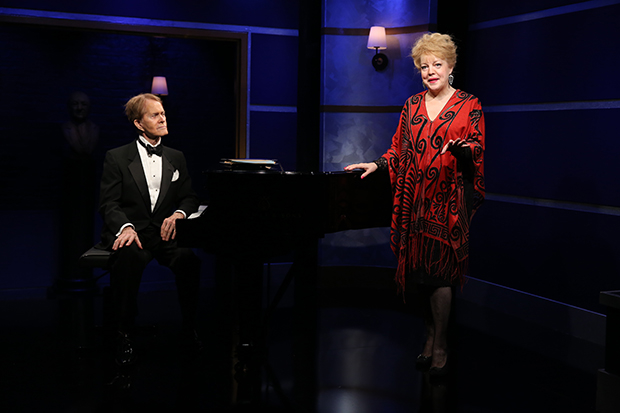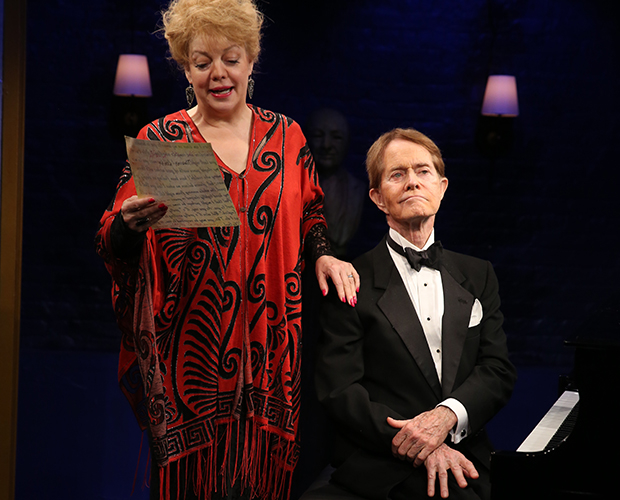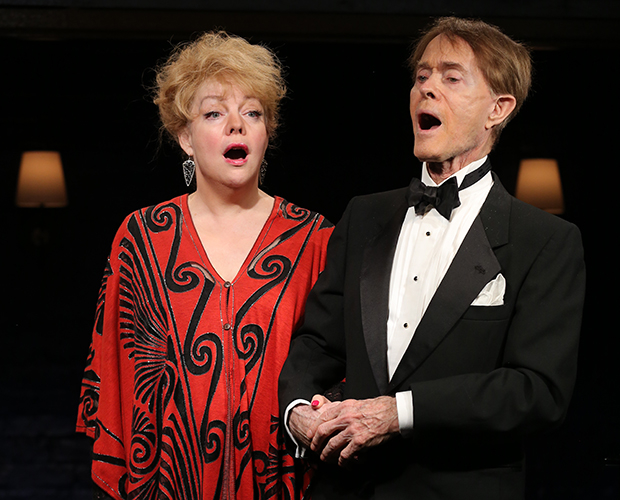Love, Noël: The Songs and Letters of Noël Coward Is a Musty Tribute to a Still-Fresh Wit

(© Carol Rosegg)
The premise of the show is simple: Ross (channeling Coward) and Sullivan (playing everyone else) deliver a truncated biography of Coward through his voluminous correspondence. This includes letters to and from Bernard Shaw, Marlene Dietrich, and Coward's most frequent pen pal: his mother Violet. Day accents the letters with numbers from the Coward songbook, including "If Love Were All" and "Mad About the Boy." Through letters and songs, Love, Noël attempts to give us an overview of one of the most iconic personalities of the 20th century — no small task for 90 minutes.
Day, who edited the published version of Coward's letters, repurposes his introduction to that book for the opening moments of this show, framing Coward's varied career with Lord Louis Mountbatten's observation that there may be better painters, novelists, librettists, composers, singers, dancers, comedians, tragedians, stage producers, film directors, cabaret artists, and TV stars than Coward, but they are 12 different people. It's just about the nicest compliment one could give a prolific man of many hats like Coward.

(© Carol Rosegg)
His erudite, cultivated, and somewhat snobbish voice still lives in these letters, and it's a delight to hear them read aloud. I love nothing more than a stylish bon vivant smirking at the cultural vanguard as it charges over a cliff — and Coward was just that: When acting guru Lee Strasberg waxed poetic about Eleonora Duse's ability to smile with her whole body, Coward wryly dubbed it "the neatest trick of the week."
But there's a fine line between a snob and a reactionary, and the mothball aroma wafting around this show often makes Coward seem like the latter. "They don't write them like they used to," speculates Sullivan's protean character on what Coward might have said about new songs (he almost certainly would have avoided such cliché). This portrait of an old curmudgeon obscures the fact that the author of Design for Living (a 1932 comedy about polyamory) was considerably cooler than most of his contemporaries, and is still cooler than many who have come after.
His vibrant wit is evident in numbers like "Why Do the Wrong People Travel?" which features the lyric,
They will take a train
Or an aeroplane
For an hour on the Costa Brava,
And they'll see Pompeii
On the only day
That it's up to its ass in Molten Lava."
Numbers like "Mrs. Worthington" and "Broxville Darby and Joan" are equally hilarious. These songs are indestructible, although Ross and Sullivan make a determined effort at demolition.

(© Carol Rosegg)
Love, Noël appears tragically underrehearsed, with the two performers stumbling over each other's lines and approximating pitchy harmonies. In the male role, Ross affects Coward's distinctive sprechstimme, which prevents him from performing anything too vocally challenging. Still, his piano accompaniment becomes awfully thin every time he opens his mouth to sing. Sullivan produces a church lady soprano in her upper register, but is far more successful when she's vocally imitating belters like Elaine Stritch. Not one, but two dialect coaches guide our performers, an extravagant effort that has resulted in English accents slightly more convincing than Dick Van Dyke's in Mary Poppins. It all resembles a memorable night at the piano bar, but it's not something you'd want to pay money to see.
This is reinforced by director Charlotte Moore's vaguely funereal production. Scenic designer James Morgan has placed a bust of Coward upstage, with a dignified vase of flowers downstage. Ross remains seated behind a gleaming Steinway grand piano through much of the show, as Sullivan stiffly stalks around him like a surviving relative. Michael Gottlieb's lighting is tasteful and soothing, and I instinctively looked for a guest book near the door to jot down my condolences.
It shouldn't feel this way. Coward has been dead since 1973, but his writing is very much alive and ready for a show that will introduce his evergreen wit to a new generation. Sadly, Love, Noël isn't it.










